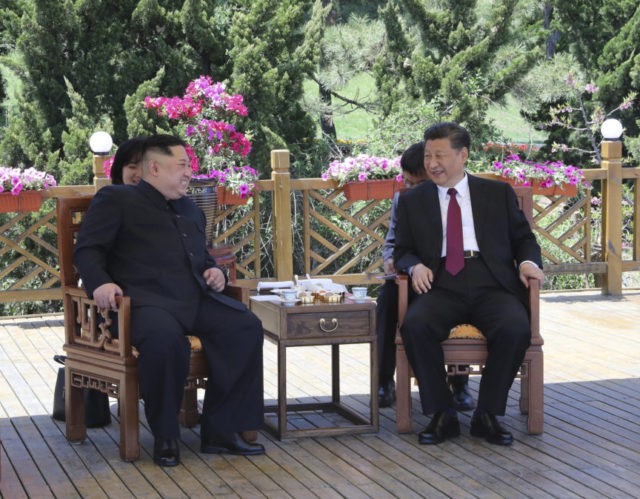Kim Jong-un made his third trip to China this year, and since assuming the position of supreme dictator of North Korea, on Tuesday, meeting Communist Party leader Xi Jinping and briefing senior Chinese officials on his meeting last week with U.S. President Donald Trump.
The Chinese government confirmed on Tuesday that Kim was in Beijing for a two-day visit, and Chinese state media broadcast images of Kim and wife Ri Sol-ju in Beijing’s Great Hall of the People to confirm his travels. Of the three visits Kim has made to the country in the past three months, this is the first that China has confirmed as it is occurring, rather than after Kim has already returned to Pyongyang.
South Korea’s Yonhap news service reported on Tuesday that Kim used a North Korean Air Koryo plane to travel the relatively short distance from Pyongyang to Beijing. For last week’s meeting in Singapore, Kim was forced to rely on a Chinese aircraft, as it was not guaranteed that the old Soviet planes in the North Korean roster would be able to safely travel the distance south to the city-state. Yonhap adds that Kim appears to have traveled through Tiananmen Square upon arrival in Beijing.
North Korean media have yet to mention that Kim left the country again, instead noting that Kim sent a friendly note and a flower arrangement to Xi on the occasion of his birthday Monday.
Chinese Foreign Ministry spokesman Geng Shuang was more forthcoming to reporters Tuesday.
“Kim Jong-un, chairman of the Workers’ Party of Korea and the State Affairs Commission, is visiting China from Tuesday to Wednesday,” Geng told reporters, adding that the meeting will “help deepen China-North Korea relations, bolster strategic communication and facilitate regional peace and stability.”
Kim’s visit appears to have coincided with a state trip by leftist Bolivian President Evo Morales, long an ally of China and most other far-left dictatorships around the world. China’s state news service Xinhua reported Tuesday that Kim met with Morales to discuss the expansion of Beijing’s One Belt One Road (OBOR) global infrastructure project into Latin America. China has proposed using OBOR to give the Chinese Communist Party access and control over a wide breadth of the world’s ports, roads, and other key infrastructure. Some Chinese officials have expressed hope that North Korea will participate in OBOR. It is not clear whether Kim and Morales ran into each other as both visited Kim on Tuesday.
While Geng did not provide more details on what Xi and Kim will be discussing, and the Chinese government has not released any official schedule, the Chinese state newspaper Global Times cited Beijing-approved experts who suggested that Kim was in town to brief Xi on his meeting with Trump last week and how Pyongyang and Washington expect to move forward with the bilateral relationship.
“Kim may discuss details on implementing the agreement signed in Singapore as North Korea needs assistance on denuclearization and China is an indispensable part of a peace treaty on the Korean Peninsula,” Zhang Huizhi, identified as vice dean of the Northeast Asian Studies College at Jilin University, told the Global Times. Zhang added that Kim is likely seeking economic support as well, echoing reports in South Korean media that Kim is looking to create “special economic zones” in North Korea to generate tourism, where North Korean citizens not of high caste will likely be banned from visiting.
South Korean experts speaking to Yonhap appear to agree with the Global Times‘ assessment.
“It appears that Kim intends to express his gratitude to China for providing support during his summit with Trump, such as offering a plane, while explaining the major agenda items discussed during the summit and pushing to take the initiative through consultations on the future situation,” Shin Beom-chul, a senior fellow at the Asan Institute for Policy Studies, told Yonhap.
Unlike Chinese state media, North Korean state media – the only legal media in the country – has not reported on the visit. Instead, it dedicated much of its coverage Monday to the relationship between China and North Korea, including a piece highlighting the praises of the General Association of Koreans in China and a report on Kim celebrating Xi’s birthday.
“Stressing that it is the steadfast will of the party and people of the DPRK to set much store [sic] by the DPRK-China friendship forged with blood and strenuously strengthen and develop it, unfazed by change of situation and any challenge,” the Korean Central News Agency (KCNA) reported, “[Kim] expressed belief that the invincible vitality and inexhaustible potentials of the DPRK-China friendship, the valuable asset of the two parties and the peoples of the two countries, will be more powerfully demonstrated in the future, thanks to the joint efforts with Xi Jinping.”
Kim first visited Xi in March, proclaiming a “spring full of happiness” between the two leaders. In May, Kim traveled to the beachside city of Dalian, where Xi threw him a “welcome banquet” and once again regaled him with gifts.
China’s state media has belied alarm in Beijing over Kim’s increasing ability to reach out to the United States without Chinese help. Following his meeting with Trump – in which China played no role – the Global Times blasted Trump for the “unrealistic idea” of trying to establish a bilateral relationship with Pyongyang that did not include China.
“As China is one of the signatories of the armistice, its participation in formulating and signing a declaration to end the war is essential to ensure its legal and historical status,” state media proclaimed shortly before the meeting, warning both sides not to sign a peace treaty. Ultimately, Kim and Trump expressed a desire to see the war end, but did not sign any documents ending it.

COMMENTS
Please let us know if you're having issues with commenting.